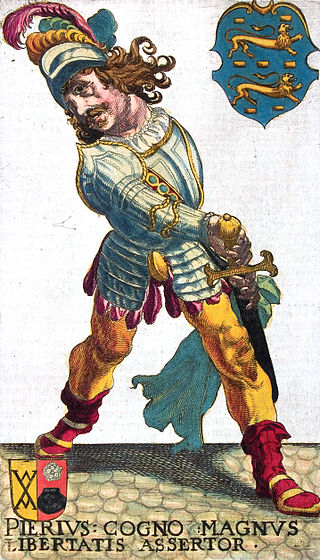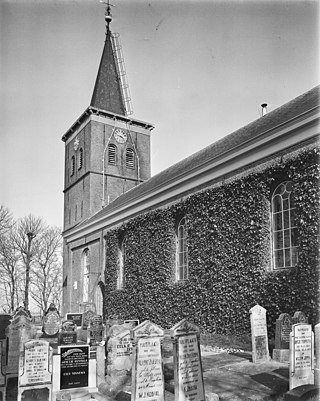Related Research Articles

Pier Gerlofs Donia was a Frisian farmer, rebel leader, and pirate. He is best known by his West Frisian nickname Grutte Pier, or by the Dutch translation Grote Pier, which referred to his legendary size, strength, and bravery.
The Friso-Hollandic Wars, also called Frisian-Hollandic Wars, were a series of short medieval wars consisting of the attempts made by the counts of Holland to conquer the free Frisian territories, which lay to the north and east of their domain. These wars were waged off and on from 1256 to 1297, 1324 to 1348, 1396 to 1411, and from 1421 to 1422, although it could be argued that a state of war continued to exist between the County of Holland and the Frisian territories till well after the year 1500.
Ygo Gales Galama was a 15th-century Frisian warlord and Galama-patriarch.
Haring Harinxma (1323–1404) was a powerful Frisian chieftain and Schieringer who lived during the 14th and early 15th centuries. Haring also used the surname Donia, and is considered the patriarch of this well known Frisian family. Another title used by Haring was thoe Heeg meaning 'of Heeg', where he was born and lived.
Jancko Douwama was a Frisian nobleman who fought to free Friesland from foreign rule during the Vetkopers and Schieringers conflict, the Saxon feud and the Guelders Wars.

The Vetkopers and Schieringers were two opposing Frisian factional parties from the medieval period. They were responsible for a civil war that lasted for over a century (1350–1498) and which eventually led to the end of the so-called "Frisian freedom".

Ferwert is a village in Noardeast-Fryslân in the province of Friesland, the Netherlands. It had a population of around 1787 in January 2017. Before 2019, the village was part of the Ferwerderadiel municipality.

Gale Hania was the thirteenth potestaat of Friesland, a province of Netherlands.

Sytse Dekama was the twelfth potestaat of Friesland, which was in the time of the religious disputes between Schieringers and Vetkopers. Little is known about Sytse Dekama; only the historian Occo Scarlensis mentions Dekama. He succeeded Juw Juwinga when Juwinga died in 1396.

Warns is a village in the northern Netherlands. It is located in the municipality of Súdwest-Fryslân, Friesland. It had a population of around 720 in January 2017.
Hessel Martena was the tenth Potestaat of Frisia. He succeeded Reinier Camminga.

Swichum is a village in Leeuwarden municipality in the province of Friesland, the Netherlands. It had a population of around 50 in January 2017.
Sjoerd Pijbes Wiarda was the fifteenth potestaat of Friesland now a province of the Netherlands.

Ingelum is a village in Waadhoeke in the province of Friesland, the Netherlands. It had a population of around 386 in January 2017. Before 2018, the village was part of the Menameradiel municipality.

Weidum is a village in Leeuwarden municipality in the province of Friesland, the Netherlands. It had a population of 576 in January 2017.

Westhem is a village in the Súdwest-Fryslân municipality, in the province of Friesland, the Netherlands. It had a population of around 70 in January 2017.

Ypecolsga is a village in Súdwest-Fryslân in the province of Friesland, the Netherlands. It had a population of around 50 in January 2017.

Focko Ukena was an East Frisian chieftain (hovetling) who played an important part in the struggle between the Vetkopers and Schieringers in the provinces of Groningen and Friesland. Aside from this he was one of the leading figures in the resistance against the forts of stately authority in East-Frisia of the tom Brok family.
Factionalism in the medieval Low Countries, in Dutch historiography known as partijstrijd or (partij)twisten, comprises several political, military and socio-economic conflicts in the Low Countries during the Middle Ages, especially the Late Middle Ages. The so-called 'parties' usually behaved like factions, which were formed ad hoc, could rapidly change in composition, and usually did not have strong ideological underpinnings. They were not officially organised political parties as would emerge in the 19th century. The parties were normally led by an aristocratic clan, followed by patrician families, and eventually several groups from the bourgeoisie, generally organised by guilds. These groups could often switch allegiances, names and goals, secede or defect, depending on how situations and interests evolved. Usually there were long-term tensions and only brief military confrontations, which either resulted in a new balance of power, or confirmed the status quo. The ruling dynasties or bishops could be dependent on the support from the strongest faction in order to govern, and in case of a war of succession, pretenders were compelled to ally themselves with one party or the other to stand a chance as seizing power. Foreign powers could interfere in factionalist struggles by providing financial or military support, and sometimes take over control of a province with the help of a local party.
Potestaat was the supposed title of a governor of medieval Friesland. According to the legendary Karelsprivilege, a 14th-century forgery, Charlemagne had first granted the title of potestaat to Magnus Forteman. He and most of his early successors were entirely fictional, invented later by pseudohistorians in order to argue in favour of the notion of Frisian freedom. The title potestaat does not appear in historical documents until 1470. It became popular after 1578, when the idea of the inherited office of potentate was linked to the new office of stadtholder, which was held by the House of Nassau-Dietz.
References
- H.G. Cannegieter, Het klooster Foswerd, in: Friesche Volks-almanak voor het jaar 1846, Sneek 1845, Mengelwerk pages 44–58. Digital scan.